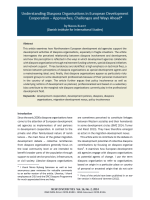Diaspora organisations in European development cooperation
Since the 2000s diaspora organisations have emerged as actors in the migration-development nexus. In contrast to the private and often family-based nature of remittances, collective remittances from diaspora organisations generally focus on the local community or are intended to benefit broader parts of the population through support to infrastructure, social service provision or civil society. Likewise diaspora organisations are sometimes perceived to constitute linkages between Western societies and their homelands in some development.
In the new article Understanding Diaspora Organisations in European Development Cooperation DIIS senior researcher Nauja Kleist examines how North West European development aid agencies support the development activities of diaspora organisations, especially in fragile situations. The article interrogates the perceived relationship between diaspora involvement and development, and how this perception is reflected in the ways in which development agencies collaborate with diaspora. Three tendencies are identified in the modes of collaboration:
- a high emphasis on technical fixes;
- a tension between perceptions of diaspora organisations as special development agents and a mainstreaming ideal; and, finally,
- that diaspora organisations appear as particularly risky recipient groups to some development professionals.
The article further argues that policy incoherence as well as underlying notions of development as planned, professionalized and based on a sedentary bias contribute to the relatively marginal role diaspora organisations currently play in the professional development field.
The article is part of a special issue of the journal New Diversities on the role of migration in the Post-2015 Development Agenda, edited by Ninna Nyberg Sørensen.
DIIS Experts


